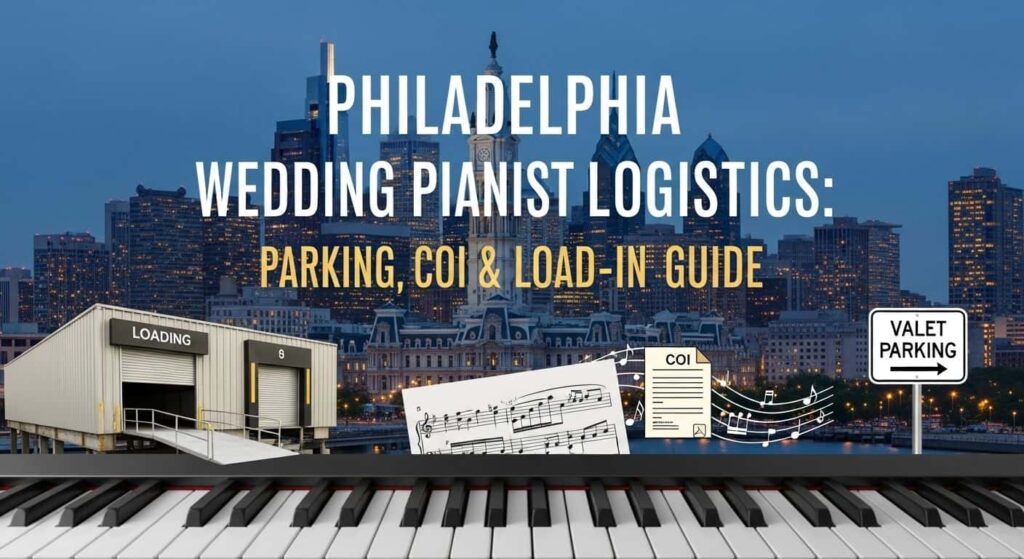Planning a Philadelphia wedding with live piano music requires more than just selecting beautiful songs—it demands meticulous attention to venue logistics, insurance requirements, and load-in procedures. From navigating Center City traffic to coordinating with venue operations teams, successful wedding entertainment depends on seamless behind-the-scenes planning.
As a professional Philadelphia pianist with over 20 years of experience performing at Philly’s most prestigious wedding venues, I’ve learned that the difference between a perfect wedding day and a stressful one often comes down to proper advance planning and logistics coordination.
“The magic happens when couples and their wedding planners understand that live piano music isn’t just about the performance—it’s about orchestrating every detail from certificate of insurance requirements to load-in windows,” explains Arnie Abrams, award-winning pianist who has performed at hundreds of Philadelphia weddings. “When logistics run smoothly, the music truly shines.”
Key Takeaways
- Certificate of Insurance (COI) requirements vary by venue but typically need $1-2 million general liability coverage
- Philadelphia Parking Authority (PPA) enforcement affects load-in timing, especially in Center City and Rittenhouse areas
- Service entrance protocols and elevator reservations must be coordinated 2-4 weeks in advance
- Power requirements for piano setups need dedicated 20-amp circuits with GFCI outlets
- Soundcheck windows should be scheduled during venue’s designated setup times to avoid noise ordinance violations
Philadelphia Wedding Pianist Setup Timeline
Essential milestones for seamless wedding day execution
Weeks Before
Submit COI & Venue Packets
Weeks Before
Site Visit & Parking Permits
Hours Before
Equipment Load-In
Hour Before
Final Soundcheck
Understanding Philadelphia Wedding Venue Logistics
Venue Operations and Coordinator Roles
Every Philadelphia wedding venue operates with specific house rules and protocols designed to ensure smooth event execution. The venue coordinator serves as your primary point of contact, while the day-of coordinator manages real-time logistics during your wedding day.
Premier Philadelphia venues like the Kimmel Center, Ballroom at the Ben, and Crystal Tea Room each have unique vendor packet requirements that must be completed well in advance. These packets typically include:
- Vendor contact information and arrival schedules
- Certificate of insurance with venue listed as additional insured
- Equipment specifications and power requirements
- Load-in timing and service entrance protocols
“Working with Philadelphia’s historic venues requires understanding their unique architectural challenges,” notes Arnie Abrams. “Some Center City locations have freight elevator restrictions or narrow service corridors that affect how we transport piano equipment.”
Back-of-House Access and Service Entrances
Most upscale Philadelphia wedding venues designate specific receiving entrances separate from guest entrances. Understanding back-of-house protocols prevents delays and ensures professional vendor coordination.
Service entrance logistics typically include:
- Dock schedule coordination with dock master
- Loading bay availability windows
- Security check-in procedures requiring photo ID
- Vendor badges for building access
- Freight elevator reservation and weight limits
Certificate of Insurance (COI) Requirements for Philadelphia Venues
Essential Insurance Coverage Components
Certificate of insurance requirements represent one of the most critical—and often misunderstood—aspects of Philadelphia wedding planning. Most venues require professional entertainers to carry comprehensive general liability insurance with specific coverage amounts and endorsements.
Standard COI requirements for Philadelphia wedding venues include:
General Liability Coverage:
- $1-2 million per occurrence limit
- $2-4 million aggregate limit
- Product and completed operations coverage
- Property damage liability protection
Additional Required Coverages:
- Automobile liability for equipment transport
- Workers’ compensation (if applicable)
- Umbrella liability for higher coverage limits
- Inland marine coverage for equipment protection
Philadelphia Venue Insurance Requirements
Historic Venues
Hotel Venues
Museum Venues
Certificate Holder and Additional Insured Requirements
The venue must be listed as both certificate holder and additional insured on your pianist’s insurance policy. This dual designation protects the venue from liability related to entertainment services.
Critical COI details include:
- Legal entity name matching venue’s official business name
- Waiver of subrogation clause protecting venue interests
- Primary and noncontributory language prioritizing venue protection
- Named insured exactly matching entertainer’s business registration
COI turnaround time varies by insurance carrier, so request certificates 2-3 weeks before your wedding date. Some venues charge rush COI fees for last-minute submissions.
Venue-Specific Insurance Variations
Different Philadelphia wedding venues have varying insurance requirements based on location, ownership structure, and risk assessment:
Historic Venues (Union Trust, Franklin Institute):
- Higher liability limits ($2-5 million)
- Additional coverage for historical property damage
- Stricter endorsement page requirements
Hotel Venues (The Logan, Rittenhouse Hotel):
- Umbrella liability often required
- Certificate reissue for policy renewals
- Proof of insurance on file maintained year-round
Museum Venues (Penn Museum, Barnes Foundation):
- Specialized inland marine coverage for artwork protection
- Enhanced liability for priceless collections
- Additional insured requirements for multiple entities
Philadelphia Parking Authority and Load-In Logistics
PPA Enforcement and Permit Requirements
The Philadelphia Parking Authority strictly enforces parking regulations, especially in high-traffic areas like Center City, Old City, and Rittenhouse. Understanding PPA enforcement patterns helps avoid costly tickets and towing during vendor load-in.
Critical PPA considerations:
- Meter bagging requires advance permits ($25-50 per meter)
- Temporary no parking signs need 72-hour advance notice
- Loading zones have strict time limits (15-30 minutes)
- Towing risk increases during peak hours and special events
Philadelphia Wedding Venue Parking Guide
Center City
Cost: $30-50/day
Load-in: Limited curbside
Risk: High PPA enforcement
Rittenhouse
Cost: $40-60/day
Load-in: Valet coordination
Risk: Premium area restrictions
Old City
Cost: $25-40/day
Load-in: Narrow streets
Risk: Tourist traffic
University City
Cost: $20-35/day
Load-in: Campus shuttles
Risk: Student activity
💡 Pro Tip: Reserve parking permits 72 hours in advance to avoid $100+ towing fees
“I always scout the route and parking situation weeks before any Center City wedding,” explains Arnie Abrams. “Philadelphia’s street closure schedules and construction can completely change your load-in plan overnight.”
Neighborhood-Specific Parking Challenges
Different Philadelphia neighborhoods present unique parking challenges for wedding vendors:
Center City:
- Limited curbside load-in opportunities
- High garage max clearance restrictions
- Frequent traffic control plans for events
- No idling zones strictly enforced
Rittenhouse Square:
- Premium valet parking coordination required
- Vendor parking pass systems at upscale venues
- Reserved loading areas with time restrictions
- Rideshare drop-off competition for curb space
Old City:
- Narrow colonial streets limit vehicle height restrictions
- Cobblestone surfaces challenge equipment transport
- Tourist traffic affects arrival windows
- Historic district regulations impact loading
University City:
- Campus shuttle schedules affect traffic flow
- Student activity creates bus lane restrictions
- Research hospital zones have emergency vehicle priority
- Penn and Drexel events cause street closures
Strategic Parking Solutions
Successful Philadelphia wedding logistics require strategic parking planning:
Advance Planning:
- Contact venue for vendor parking recommendations
- Research nearby self-parking garages with equipment access
- Coordinate arrival windows with other vendors
- Plan strike time and load-out procedures
Day-of Execution:
- Arrive during designated call times
- Use hand trucks and dollies for equipment transport
- Maintain advance notice communication with venue
- Follow no-stair routes when possible
Load-In Procedures and Equipment Transport
Wedding Piano Setup Checklist
📋 Pre-Event Planning
🎹 Equipment & Setup
⚡ Power Requirement: Dedicated 20-amp circuit with GFCI protection within 25 feet of performance area
Pre-Event Site Visits and Route Planning
Professional wedding pianists conduct thorough site visits to understand venue logistics before the wedding day. This advance planning prevents equipment damage and ensures smooth load-in procedures.
Essential site visit checklist:
Access Routes:
- Service entrance locations and doorway widths
- Freight elevator dimensions and weight limits
- Hallway turns and potential obstacles
- Threshold ramps and stair counts
Floor Protection:
- Masonite sheets requirements for equipment transport
- Carpet protection during heavy equipment movement
- Cable ramp placement for electrical runs
- Gaffer tape policies and alternatives
Piano-Specific Transport Considerations
Different piano types require specialized transport planning:
Acoustic Baby Grand:
- Professional piano movers with skid boards
- Ramp slope guidelines not exceeding 1:12 ratio
- Climate control considerations for tuning stability
- Humidity control requirements (40-60% RH)
88-Key Digital Piano:
- Weighted keys models require careful handling
- Keyboard stands with proper bench height adjustment
- Sustain pedal and cable management
- Instrument cases for weather protection
Upright Piano or Piano Shell:
- Venue-provided instruments need tuning schedules
- Pedal noise mitigation on hard surfaces
- Soft pedal adjustments for volume control
- Music stand and microphone stand positioning
Equipment Setup and Power Requirements
Professional piano setups require specific electrical infrastructure:
Power Specifications:
- Dedicated 20-amp circuits prevent breaker trips
- 120V household power with clean power conditioning
- GFCI outlets required for outdoor or wet locations
- Power drop locations within 25 feet of performance area
Audio Equipment:
- PA systems with powered speakers for larger venues
- Stage monitors for performer feedback
- Small format mixers for multiple input sources
- DI boxes for direct piano connections
Cable Management:
- XLR cables for professional audio connections
- TRS quarter-inch and RCA adapters for compatibility
- Extension cord ratings appropriate for electrical loads
- Cord covers and cable ramps for guest safety
Venue Power Systems and Technical Requirements
Electrical Infrastructure Assessment
Understanding venue electrical systems prevents power-related performance issues during your wedding ceremony and cocktail hour.
Power system evaluation includes:
Circuit Analysis:
- Electrical panel access for breaker identification
- Voltage drop calculations for long cable runs
- Ground loop hum prevention strategies
- Surge protector and power conditioner requirements
Load Distribution:
- Separate circuits for lighting and audio equipment
- Dedicated circuits for high-power devices
- Backup power options for critical equipment
- Battery pack systems for emergency situations
Acoustic Considerations and Sound Management
Philadelphia venues have varying acoustic properties that affect piano performance:
Room Acoustics:
- Reflective surfaces (marble, glass) enhance piano resonance
- Soft seating layouts absorb sound and reduce projection
- Dance floor placement affects guest circulation patterns
- Ceiling height impacts natural reverb characteristics
Noise Management:
- Decibel limits enforced by venue noise ordinances
- Quiet hours restrictions in residential neighborhoods
- Soundcheck windows coordinated with venue schedules
- Venue acoustics optimization through equipment positioning
Wedding Day Timeline Coordination
Arrival Sequences and Vendor Coordination
Successful wedding day execution requires precise timeline coordination among all vendors. Piano setup typically occurs during the ceremony preparation phase, allowing time for soundchecks and equipment testing.
Optimal arrival sequence:
- Early Setup (3-4 hours before ceremony)
- Equipment load-in during designated windows
- Power connections and audio testing
- Initial soundcheck without wedding party
- Mid-Day Preparation (2-3 hours before)
- Final equipment positioning based on floor plan
- Microphone placement for wedding ceremony
- Coordination with wedding photographers for equipment visibility
- Final Preparations (1 hour before)
- Line check with all audio equipment
- Setlist planning and special requests review
- Communication with wedding planners for timing cues
Music Timeline and Cue Management
Professional wedding ceremony music requires precise timing coordination:
Ceremony Music Schedule:
- Prelude music (30 minutes before ceremony)
- Processional timing coordinated with wedding party
- Special music during vows or unity ceremonies
- Recessional cues for dramatic exits
Reception Transitions:
- Cocktail hour music maintaining conversation levels
- Dinner sets with appropriate volume adjustments
- Break schedules coordinated with catering service
- Emcee cues for special announcements
“The key to flawless wedding entertainment is invisible coordination,” notes Arnie Abrams. “Guests should never notice the technical aspects—they should only experience the magic of live music enhancing their celebration.”
Safety Protocols and Risk Management
Fire Safety and Emergency Procedures
Philadelphia wedding venues maintain strict fire code compliance requirements that affect equipment placement and emergency procedures.
Safety considerations include:
Equipment Placement:
- Egress paths must remain clear at all times
- Exit signage cannot be obstructed by music equipment
- Trip hazard mitigation through proper cable management
- Dance floor access maintained for emergency evacuation
Electrical Safety:
- GFCI outlets required for outdoor or wet conditions
- Surge protection prevents equipment damage
- Cable runs secured with cord covers and gaffer tape
- Power conditioning reduces electrical interference
Weather Contingency Planning
Outdoor weddings and tented events require comprehensive weather contingency plans:
Rain Protection:
- Covered load-in areas for equipment protection
- Tarp coverage during transport and setup
- Weather-proof cases for sensitive electronic equipment
- Backup indoor locations with pre-planned setups
Extreme Weather Events:
- High wind advisories affecting tent stability
- Heat advisories requiring additional climate control
- Cold weather plans for instrument tuning stability
- Snow emergency procedures and equipment access
Equipment Security and Theft Prevention
Professional wedding entertainment equipment represents significant investment requiring theft prevention measures:
Security Protocols:
- Equipment inventory documented before and after events
- Staging areas in secure, monitored locations
- Green rooms or holding areas for valuable instruments
- Insurance coverage for theft and damage claims
Incident Management:
- Point of contact information for day-of emergencies
- Incident report procedures for equipment damage
- Coverage for damage through venue or entertainer insurance
- Replacement equipment protocols for emergency situations
Coordination with Wedding Professionals
Working with Wedding Planners and Event Teams
Successful Philadelphia weddings require seamless coordination between wedding planners, venue staff, and entertainment professionals. Experienced wedding planners understand the importance of early vendor communication and detailed logistics planning.
Effective coordination includes:
Pre-Wedding Communication:
- Timeline buffer built into schedules for unexpected delays
- Final walkthrough with all key vendors present
- Floor plan PDFs shared with equipment placement details
- Power maps indicating electrical outlet locations
Day-of Communication:
- Cell phone contact for immediate day-of coordination
- Text updates for timeline changes or delays
- Radio channel assignments for large venue coordination
- Vendor list with all contact information centralized
Integration with Other Wedding Vendors
Piano entertainment must integrate seamlessly with other wedding services:
Photography and Videography:
- Sightline planning ensuring unobstructed views
- Equipment positioning that enhances rather than detracts from photos
- Lighting coordination for optimal video recording
- Guest flow management during key musical moments
Catering and Service Staff:
- Vendor meal coordination for long event days
- Service timing aligned with musical performances
- Table setup considering acoustic requirements
- Guest seating optimized for piano performance visibility
Florists and Decorators:
- Decoration placement that doesn’t interfere with sound projection
- Power access maintained despite extensive decorative elements
- Setup timing coordinated to prevent decoration damage
- Color coordination for equipment that appears in photos
Philadelphia Venue-Specific Protocols
Historic and Landmark Venues
Philadelphia’s rich history creates unique challenges for wedding entertainment at landmark venues:
Union Trust Building:
- Historic preservation requirements limit equipment modifications
- Marble surfaces create excellent acoustic reflection
- High ceilings require adjusted volume levels
- Vintage elevators have weight restrictions for equipment transport
Franklin Institute:
- Museum protocols require special handling procedures
- Interactive exhibits must be protected during load-in
- Security procedures include background checks for vendors
- Educational mission influences noise ordinances
Crystal Tea Room:
- Ornate decorations require careful equipment placement
- Historic architecture affects electrical infrastructure
- Limited load-in windows due to restaurant operations
- Union labor requirements for certain setup tasks
Modern Hotel and Event Venues
Contemporary venues offer different advantages and challenges:
Kimmel Center:
- Professional audio systems often available for rent
- Union stagehands required for equipment handling
- Load-in schedules coordinated with performance calendar
- Acoustic excellence designed for musical performances
The Logan Hotel:
- Luxury service standards extend to vendor treatment
- Valet coordination for vendor vehicle management
- Concierge assistance with logistics planning
- Premium location creates parking challenges
Vie by Cescaphe:
- Multiple venue locations each with unique requirements
- Standardized vendor packets streamline planning
- Preferred vendor lists include recommended entertainers
- Corporate event experience benefits wedding coordination
Outdoor and Garden Venues
Fairmount Park and other outdoor venues require specialized planning:
Horticulture Center:
- Generator rentals necessary for electrical power
- Inverter generators reduce noise pollution
- Fuel storage rules governed by park regulations
- Environmental protection protocols strictly enforced
Waterworks:
- Tent requirements for weather protection
- Tent sidewalls and flooring affect acoustics
- Backup generators required for extended events
- Load-in vehicles restricted to designated paths
Cost Considerations and Budget Planning
Direct Costs for Piano Entertainment Logistics
Planning Philadelphia wedding piano entertainment involves several cost categories beyond the performer’s fee:
Insurance and Permits:
- Certificate of insurance processing: $25-75
- Parking permits and meter bagging: $50-200
- Venue COI rush fees: $100-300
- Additional insured endorsements: $50-150
Transportation and Logistics:
- Equipment transport in urban areas: $150-400
- Professional piano moving: $300-800
- Parking garage fees: $20-50 per day
- Load-in labor assistance: $100-300
Technical Requirements:
- Power conditioning equipment rental: $75-200
- Audio equipment supplements: $200-500
- Weather protection for outdoor events: $100-300
- Backup equipment insurance: $50-150
Hidden Costs and Fee Structures
Understanding venue-specific fee structures prevents budget surprises:
Union Venue Requirements:
- Stagehand fees for equipment handling: $200-600
- Tip pool contributions: 15-20% of vendor fees
- Overtime charges for extended setup: $100-200 per hour
- Union house rules may require specific contractors
Venue Service Fees:
- Elevator reservations: $50-150
- Security escort during load-in: $75-200
- Vendor meal requirements: $25-75 per person
- Parking validation costs: $15-30 per vendor
Wedding Piano Logistics Cost Breakdown
Total Estimated Logistics Cost
Beyond pianist performance fee
Budget Optimization Strategies
Smart wedding planning can reduce logistics costs without compromising quality:
Early Planning Benefits:
- Advance COI requests avoid rush fees
- Off-peak timing reduces parking costs
- Vendor coordination minimizes duplicate charges
- Package deals with comprehensive service providers
Venue Selection Impact:
- All-inclusive venues often include logistics support
- Preferred vendor relationships may offer discounts
- On-site parking eliminates street parking challenges
- In-house equipment reduces rental needs
Technology and Modern Considerations
Digital Integration and Streaming Capabilities
Modern Philadelphia weddings increasingly incorporate digital technology requiring additional technical considerations:
Live Streaming Requirements:
- Audio feeds for remote ceremony viewing
- Multiple camera angles requiring equipment coordination
- Internet bandwidth assessment for quality streaming
- Backup recording systems for technical failures
Social Media Integration:
- Hashtag displays coordinated with musical moments
- Photo sharing timing aligned with performance highlights
- Live posting by wedding photographers
- Guest interaction through song request apps
Accessibility and ADA Compliance
Philadelphia venues must maintain ADA accessibility standards affecting equipment placement:
Physical Accessibility:
- Ramp access for guests with mobility challenges
- Elevator priority during busy load-in periods
- Mobility assistance coordination with venue staff
- Aisle width maintenance for wheelchair access
Sensory Accommodations:
- Hearing loop systems for guests with hearing aids
- Sign language interpreter coordination with musical cues
- Volume control for sensory sensitivities
- Visual cues for guests with hearing impairments
Environmental Sustainability
Eco-conscious couples increasingly prioritize sustainable wedding practices:
Equipment Efficiency:
- Energy-efficient amplification systems
- Local sourcing reduces transportation emissions
- Equipment sharing among vendor teams
- Minimal packaging for equipment transport
Carbon Footprint Reduction:
- Public transportation encouragement for vendors
- Electric vehicle charging coordination
- Waste reduction in setup materials
- Recycling programs for event materials
Frequently Asked Questions
How far in advance should I submit my pianist’s certificate of insurance to my Philadelphia wedding venue?
Most Philadelphia wedding venues require certificates of insurance to be submitted 2-4 weeks before your wedding date. However, popular venues like the Kimmel Center or Crystal Tea Room may request COIs up to 6 weeks in advance during peak wedding season. Submit your pianist’s insurance documentation as early as possible to avoid rush processing fees and ensure all endorsement requirements are properly handled.
What are the typical parking costs for wedding vendors in Center City Philadelphia?
Vendor parking in Center City Philadelphia typically ranges from $20-50 per day for garage parking, with meter fees costing $2-4 per hour. Many venues offer vendor parking passes or validation programs that can reduce costs. Loading zone permits through the Philadelphia Parking Authority cost $25-50 per meter and require 72-hour advance notice for approval.
Do all Philadelphia wedding venues require the same insurance coverage amounts?
Insurance requirements vary significantly among Philadelphia wedding venues. Historic venues and museum locations typically require $2-5 million in general liability coverage, while hotel venues may accept $1-2 million. Outdoor venues in Fairmount Park often require additional environmental liability coverage. Always request specific COI requirements from your venue coordinator to ensure proper coverage amounts and endorsement language.
What should I do if my pianist encounters equipment problems during setup?
Professional wedding pianists maintain backup equipment and contingency plans for technical issues. Contact your pianist immediately if problems arise, as most experienced entertainers carry spare cables, backup power supplies, and alternative instruments. Venues often have on-site maintenance staff who can assist with electrical issues or equipment access problems during setup.
How do I coordinate piano setup timing with other wedding vendors?
Successful vendor coordination requires detailed timeline planning with your wedding planner or day-of coordinator. Piano setup typically occurs 2-3 hours before ceremony start time, allowing for soundchecks and final adjustments. Share your vendor arrival schedule with all team members and maintain open communication channels for real-time updates on setup progress.
What happens if weather affects my outdoor Philadelphia wedding piano performance?
Weather contingency planning is essential for outdoor weddings in Philadelphia. Professional pianists provide weather-resistant equipment and covered setup options for light rain. Severe weather requires backup indoor locations or postponement procedures outlined in your entertainment contract. Tent rentals with proper flooring and electrical infrastructure can protect equipment during uncertain weather conditions.
Ready to Plan Your Perfect Philadelphia Wedding?
Let Arnie Abrams handle all the logistics while you focus on your special day
Conclusion: Orchestrating Your Perfect Philadelphia Wedding
Successful Philadelphia wedding piano entertainment requires meticulous attention to logistics planning, from certificate of insurance requirements to load-in coordination. By understanding venue-specific protocols, parking challenges, and technical requirements, couples can ensure their live wedding music creates magical moments without logistical stress.
“The most beautiful wedding ceremonies happen when every detail is planned with precision,” reflects Arnie Abrams. “From the moment we arrive at the service entrance to the final notes of your recessional music, professional coordination ensures your guests experience only the joy and elegance of live piano performance.”
Whether you’re planning an intimate ceremony in Rittenhouse Square or a grand celebration at the Franklin Institute, proper logistics planning transforms potential challenges into seamless execution. The investment in thorough advance planning pays dividends in stress-free wedding day experiences that exceed your highest expectations.
Ready to plan your perfect Philadelphia wedding with professional piano entertainment? Contact Arnie Abrams to discuss your venue logistics, insurance requirements, and musical vision for an unforgettable celebration that harmoniously blends logistical precision with artistic excellence.
Quick Contact Information
Professional Philadelphia wedding pianist serving Center City, Rittenhouse, Old City & surrounding areas





